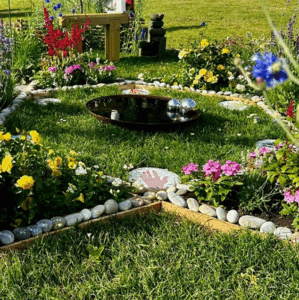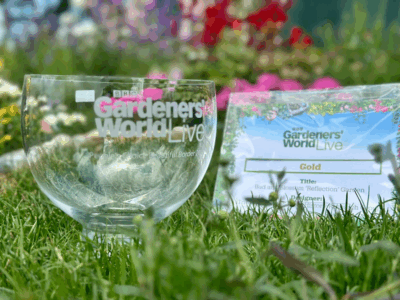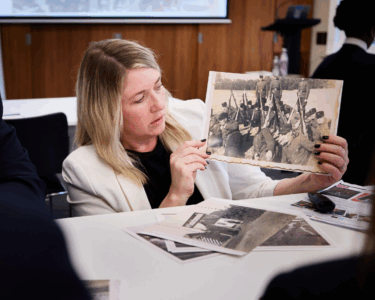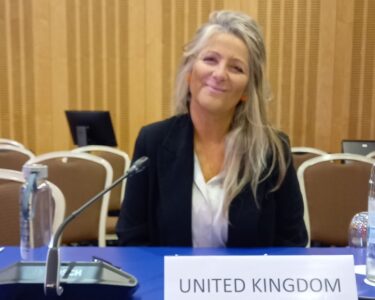From Debbie Hayden
What a remarkable term it has been—a fitting farewell to the final original members of the Trinity History Research Group as they move on to their A-Level studies. Their dedication has left an indelible mark, and I’ll be forever grateful for the countless evenings, weekends, and school holidays they have devoted to the project.
 Eighteen months ago, we gathered to brainstorm ideas for Holocaust Memorial Day. Among the suggestions listed by the Holocaust Memorial Day Trust was the creation of a commemorative planter. While well-meaning, it didn’t quite capture the lasting impact the students envisioned. They wanted something bigger—something meaningful that would stand the test of time.
Eighteen months ago, we gathered to brainstorm ideas for Holocaust Memorial Day. Among the suggestions listed by the Holocaust Memorial Day Trust was the creation of a commemorative planter. While well-meaning, it didn’t quite capture the lasting impact the students envisioned. They wanted something bigger—something meaningful that would stand the test of time.
That modest suggestion sparked an ambitious plan: to transform a neglected courtyard into a Holocaust memorial garden, complete with a bespoke mosaic. Unveiled during Refugee Week 2024, the garden became a space for reflection and remembrance. We were honoured that project family members were able to join us and plant roses in memory of their relatives. The response to the garden was overwhelmingly positive, and the students weren’t ready to stop there.
They recorded and submitted a video for the ‘My Garden’ segment of Gardener’s World. When no reply came, inspired and undeterred they decided to take things further—by entering the show itself at ‘Gardener’s World Live. With 2025 marking the 80th anniversaries of the liberation of Auschwitz and the end of World War II, it felt like the right time to design a new memorial garden, inspired by the stories behind Holocaust: Their Family, Me and Us project.
Our submission, entered just before the deadline, was a leap of faith. So, when an email arrived weeks later from the BBC’s Horticultural Director confirming our acceptance, disbelief quickly turned to determination.
Attending the initial briefing at the NEC in March was humbling. Surrounded by professional designers and horticultural students, we felt the weight of the challenge ahead. We were very much in the “Beautiful Border on a Budget” category, relying heavily on donations, resourcefulness, and the generous support of the 45 Aid Society.
The countdown to our gardening “D-Day” on June 7th was a blur of sourcing plants, fundraising, promoting our project, and, for the students, revising for their GCSEs. Our aim at this point was simply to create something that resembled our design. The night before, our school chaplain blessed the plants—a much-needed moment of calm before the whirlwind began.
Build day arrived, and our extended team—staff, parents, alumni, and local volunteers—loaded up and headed to Birmingham. Over four intense days, we navigated everything from last-minute plant replacements to live radio interviews, all while juggling exams.
Judging took place on Wednesday. With just minutes to explain our garden’s symbolism and planting. We managed to pull it off. The assessors were deeply moved by our design. That same day brought another whirlwind: a Maths exam, a Geography paper, a live television interview, and finally, the awards ceremony—where we were stunned to receive a Gold Award.
And the surprises didn’t stop there.
When the show opened, we were met with an incredible outpouring of public interest. From the moment the gates opened at 9am until rain paused conversations at 2pm, we didn’t stop talking to visitors about our garden. By the second day, we had to print leaflets because we simply couldn’t speak to everyone. Hearing such heartfelt responses to our design was truly humbling—and inspiring.
The final day brought yet another highlight. At 4pm, Gardeners’ World’s Nick Bailey announced the winner of the People’s Choice Award for Best Beautiful Border. We won. Another surreal moment in an amazing week that far exceeded anything we could have imagined. Hundreds of conversations, sore feet, and aching backs had been worth it.
But the legacy doesn’t end there.
 Even before the accolades, we knew this garden wasn’t just for show. Elements of our design are now being shared with the Holocaust Project in the Lake District. Plans are underway for a sister garden at the Lakes School, commemorating the Windermere children, with a hoped-for opening on 14th August, the 80th anniversary of ‘The Boys’ arrival at the Calgarth Estate. We’re also fundraising to recreate the memorial garden on our own school site—a permanent space for reflection and education.
Even before the accolades, we knew this garden wasn’t just for show. Elements of our design are now being shared with the Holocaust Project in the Lake District. Plans are underway for a sister garden at the Lakes School, commemorating the Windermere children, with a hoped-for opening on 14th August, the 80th anniversary of ‘The Boys’ arrival at the Calgarth Estate. We’re also fundraising to recreate the memorial garden on our own school site—a permanent space for reflection and education.
This project was only possible thanks to an extraordinary team: Sally’s tireless energy, Sam’s creative vision, the willing build and pack down crew, Lucy Cooke Mosaics’ generous support, and the unwavering encouragement from everyone involved in Holocaust: Their Family, Me and Us Project. And, of course, the four Year 11 students whose passion and perseverance brought this garden to life.
What a journey it has been. You’ve set a high bar for those who follow.



